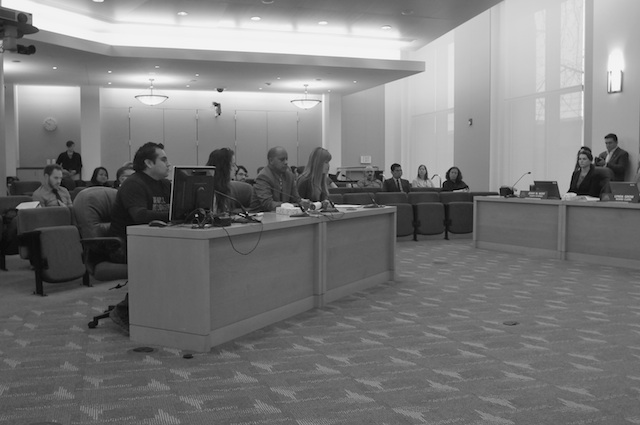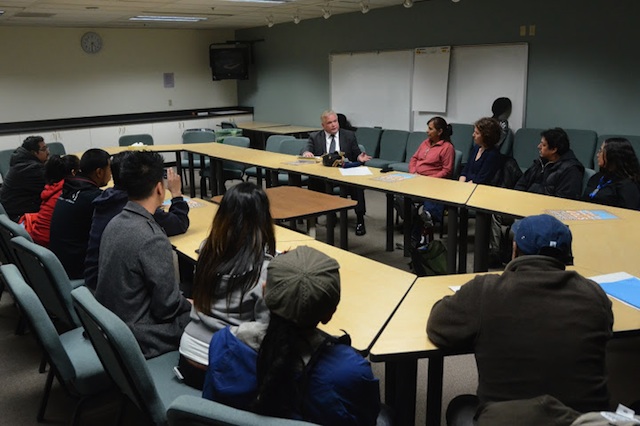Story by Pete Shaw
Multnomah County Commissioners unanimously supported a resolution on April 4th revising the Sheriff’s Office (MCSO) plan for handling Immigration and Customs Enforcement (ICE) immigration detainers. Under the new rule, which goes into effect on April 15th, the MCSO says it will only honor ICE requests to hold prisoners it believes to be without documentation if an individual has been charged with a Felony or Class A Misdemeanor, or if ICE can prove a person without documentation has a criminal history that makes him or her a public safety threat.
Currently, the Sheriff works with ICE on all hold requests. MCSO makes no distinction between an ICE request for a person pulled over for a speeding ticket or a person arrested for murder, although the vast majority of detainer requests are for people committing misdemeanors, such as speeding or driving without a license. The policy has been a source of controversy within both the immigrant community and the community at large. Detentions have torn apart families, made people distrustful of their local government and reluctant to report crime. According the the Agenda Placement Request filed prior to the board meeting, the new policy was crafted after Sheriff Daniel Staton worked with “community advocates, service providers, and the Multnomah County Chair’s Office” to balance “the public safety needs of the county, the preservation of scarce county resources, and compliance with prevailing constitutional standards.”
Staton, who for some time has been wrestling with how much leeway he has when dealing with ICE, has now concluded that ICE detainers are requests, not obligations. He made clear that this change in policy was not “the Sheriff’s Office picking and choosing laws to enforce,” but rather a decision arrived at after meeting with various state and federal officials. The shift represents an about face on Staton’s part. At a meeting with community activists in December 2012, Staton expressed reservations about spending time in his own jail for breaking the law should he fail to honor ICE hold requests. In an email sent out ten days later he wrote that after consulting with various officials, he found ICE hold requests to be “mandatory.”
County Chair Jeff Cogen intoned about the need for “strong, trusting relationships” between government and citizenry if there is to be a truly safe community. Both Cogen and Staton emphasized that this eroding safety was not just limited to the direct effects of ICE holds on detained immigrants and their families, but also to its effects on other immigrants and the community as a whole. Cogen noted that some immigrants feared getting government services, such as vaccinations for their children, because it might put them at risk of being whisked away from their families. In turn, the unvaccinated children could be a threat to the health of the community.
When ICE began implementing the Secure Communities program, it created a backlash in many communities. People whom neighbors had come to know, respect, and love were suddenly missing, leaving behind families just as confused, and often without a breadwinner. Though the vast majority of those detained by ICE were guilty of misdemeanors such as speeding or driving without a license, ICE began crafting the caricature of the immigrant without documentation – always understood to have brown skin – as a drug dealer, rapist, murderer, or similar purveyor of violent crime.
Guillermo Maciel, Cogen’s Policy Advisor, said he had spent the past two and a half years “listening intently to our community members” and had heard too many “anguishing stories”. That suffering in the immigrant community led many community activists to push for the MCSO to completely abandon its cooperation with ICE – a position Cogen supported. Maciel worked with both activist groups and Staton’s office to keep the conversation going until finally Cogen and Staton found a middle ground that provided for public safety while decreasing the impact of ICE holds related to civil immigration laws. Maciel noted that the new policy was not “an unmitigated ‘no’” to ICE detainers, but rather, a compromise involving complex issues that “shows a way forward for other law enforcement agencies” that seeks to strike a balance between “public safety, justice, and human rights.”

Supporters of easing ICE detainers testify in front of the Multnomah County Board of Commissioners. Photo by Pete Shaw.
Another factor in the decision is prison space. Staton said the county’s 1,310 jail beds do not meet capacity, leading to the premature release of 913 inmates in 2012. When ICE requests the MCSO hold a prisoner, that means she or he must be detained up to another 48 hours, all without compensation from the federal government. Cogen noted that the ICE Detainers force the release of prisoners convicted of “higher, more dangerous crimes.” Instead, Cogen said his office and the MCSO decided the Obama policy of using “prosecutorial discretion to focus on people committing dangerous crimes” would become the guide.
While the new policy is certainly a good step, some activists see it as a work in progress. Francisco Lopez, Executive Director of CAUSA, saw it as a “good first step, a great beginning” and expressed his appreciation to Staton, the county commissioners, and Maciel. Kayse Jama, Executive Director of the Center for Intercultural Organizing, acknowledged the compromise will “help a lot of families.” He expressed the importance of a monitoring task force, as well as an annual report to see how the policy is working.
Nicole Brown of the Center for Intercultural Organizing and Ricardo Valero of the Oregon Dream Activists, both expressed concern about the level of collaboration between the MCSO and the community. Like Jama, Brown noted the need to establish a task force on oversight where the community can give input about the new policy’s implementation, while Valero said there needed to be a “clear way the undocumented community can give input” as to how to make an even better policy.
Marco Mejia of Jobs with Justice noted this “very good step forward,” but added that it is only “one step forward.” Both he and Romeo Sosa of the VOZ Workers’ Rights Education Project reminded the MCSO and the commissioners that passing the resolution is easy, but the real work will lie in restoring “the trust that’s already been broken.”
Maciel noted that the next steps for the Chair’s Office is to promote information regarding the Board’s action and MCSO’s changes in policy. “Hopefully we, the County along with our community advocates and service providers, can promote the actions the Board of County Commissioners and the Sheriff have taken, and help people understand the facts… help them understand what this policy change is and what it is not; so folks can make up their own mind on what it means for their community,” he said. “As someone who grew up without my father because of deportation, as someone who has been deeply affected by immigration policy, I am fairly confident that when our community learns about these changes at the County, they will know that progress has been made, and an alternative now exists for other jurisdictions around the country.”
Reverend Lynne Smouse Lopez of the Ainsworth United Church of Christ brought forth a larger point surrounding ICE holds and subsequent detentions, regarding the rise of the security state and its attendant private security apparatus that extends from police to for-profit prisons. According to an article on Grassroot Leadership’s website, David Venturella, a former assistant director at ICE, was responsible for many emails promoting strategies that would increase the number of ICE detentions. Venturella is now Executive Vice President for Corporate Development at GEO group, a private prison corporation whose profits are heavily dependent on federal immigration contracts.
With an eye only toward profit – a profit that comes from prisoners filling their jail cells – these private corporations have a deep interest in lobbying for laws that increase the number of people who can be classified as criminals. In that respect, Lopez noted how this resolution is a step in the right direction, and that “any way we can separate ourselves from law enforcement is a good thing.”
Missing from the resolution was any mention of why people immigrate to the US. Since the issue of people without documentation is largely focused on immigrants from Mexico, Central, and South America, the resolution would have had greater clarity had it mentioned the trade arrangements such as NAFTA and CAFTA that compel people to come to this country. People do not willingly give up family, friends, and community, but the dire results of these Free Trade Agreements (FTAs) has created a mass of people whose only rational economic choice is to take the risks involved with crossing into the US in order to try and support themselves and their families.
Ultimately, the question still remains as to why the MCSO is working with ICE. This agreement, while a step forward, has no legal meaning, and the MCSO can repeal it at will. Considering that ICE has deportation quotas that it considers unmet, despite a record number of deportations during the Obama Administration, this compromise should be taken with many grains of salt.
Claire Flanagan, organizer for the Portland Central America Solidarity Committee (PCASC) which both is a member of ACT and has for many years organized against FTAs, said, “This policy shift is a direct result of the work of the ACT Campaign over the past five years to organize, mobilize, and demand change. We recognize this shift as a product of this campaign and small step in the right direction. The Sheriff has stated that he ‘will continue to honor holds against felons’ which means people will still be locked up and families torn apart. The fact is that he doesn’t have to honor any hold. Until Staton has severed all ties with ICE, this campaign will continue. It’s clear to us that continued community pressure against positions of power is the only way to end deportations in the county and ensure justice for our communities.”
For more information see:
MCSO’s I-247 Immigration Detainers Protocol – FACT SHEET
Multnomah County Board Resolution








